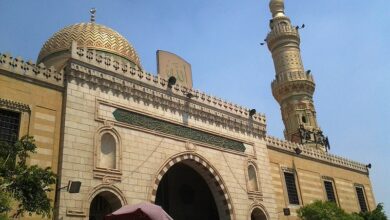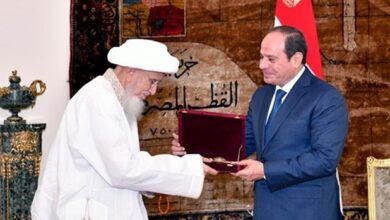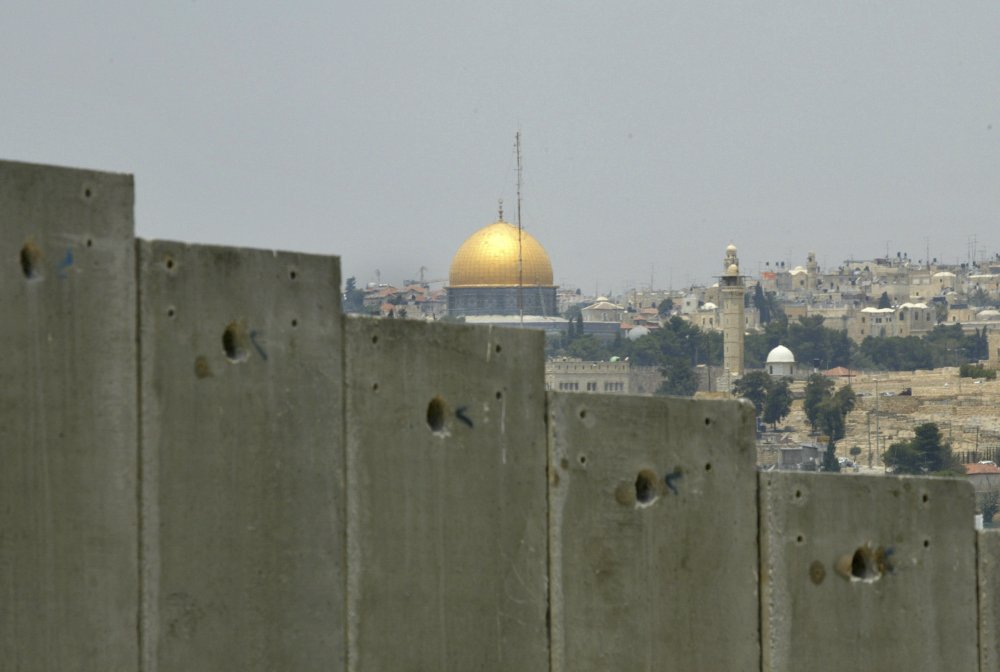
Egyptian presidential frontrunner Abdel Fattah al-Sisi gave Reuters a wide-ranging interview. The following is the full text.
Q: How long do you think it will take to make real difference. What is your expectation as to the timetable before people start seeing real change?
A: The idea of 100 days. The Egyptians expected a lot of things. During two revolutions they were aspiring for bread, freedom, social justice. The Egyptians wanted to love this. I need to give them security and stability and complete development.
The truth is one hundred days is not enough. The challenges present in Egypt are so many. Programs available in Western countries, the situations are much more stable in all fields compared to the reality in Egypt. I believe that within two years of serious, continuous work we can achieve the type of improvement Egyptians are looking for.
Q: Is there a leader in the past in Egypt or anywhere around the world who you are trying to model yourself after? Do you see a Nasser, do you see a Sadat do you see somebody you have in your mind that would be a good model for what you want to be?
A: Every era and every stage has a leader to lead and succeed. The current time we are in now the situation is very different than other eras. We need to work with seriousness to serve Egyptians.
Q: I guess the first challenge next week around the 26th is to see if a lot of people are going to vote. How important is voter turnout to your sense of being successful in the election?
A: We succeeded in the first step of the road map and the constitution and this was a very great constitution. It achieved a lot of what Egyptians had hoped for in their lives and their futures. The number of Egyptians who voted was very considerable, in the millions. But we need in the coming elections a greater number than those who voted in the constitution. So they can choose with their full will who will lead them in the coming stage.
Q: Is there a particular level of turnout you would consider successful?
A: I hope that all Egyptians vote. We have more than 50 million voters. I hope they all vote. This is an opportunity to express their will.
Q: So you are looking for 100 percent?
A: I hope so.
Q: The U.S. has been a strategic partner of Egypt for a long time. What is your current assessment of the state of the relations with the United States? What areas would you like to improve?
A: Our relationship with the United States of America is a strategic, stable and steady relationship. It does not mean that during certain times, a state of confusion, that we cannot continue that. Of course not. These ties are stable and the world now is interrelated. There is no room for one state to form relationships at the expense of the other. In Egypt we need to cooperate with all states as the amount of challenges in Egypt are very huge that need support and the participation of all.
Q: There has been a partial freeze on military aid do you anticipate that lifting once you become president?
A: Let's be clear, I understand the European, Western and America standards concerning the freezing and suspension of equipment. Although this had a very negative reaction from the Egyptian people. The more time that passes the more the vision gets clearer to everyone. People and the world realize what happened in Egypt was the will of all of the Egyptian people. The army could not have abandoned its people or there would have been a civil war and we don't know where that would have taken us. We understand the American position. We hope that they understand ours.
Q: Is there anything in particular you would like to say to President Obama about the direction of Egypt that might be helpful in shifting the views there?
A: We are fighting a war against terrorism. The Egyptian army is undertaking major operations in the Sinai so that it is not transformed into a base for terrorism that will threaten its neighbors and make Egypt unstable. If Egypt is unstable then the region is unstable. I don't think this is in the interest of security and peace in the entire world. We need American support to fight terrorism, we need American equipment to combat terrorism. Not just in Sinai. Today we are present and working to secure our borders which are long and stretch from the start of the Mediterranean Sea until 1,200 kilometers on the Libyan border, and similarly with Sudan. Aside from sea borders that stretch more than 3,000 kilometers. That needs real security. You see how unstable the region is.
Q: On Libya, there is a tremendous amount of instability in Libya. Do you see Libya as a threat?
A: The situation is not just Libya. We have to be wary of the spread of the terrorist map in the region. I imagine there is a role from the West on that. They have not continued their mission in Libya. There should have been a collection of weapons that are present everywhere until the country stabilizes and has a government. Because there wasn't sufficient soldiers or police so that this country would stabilize and enter a process of real democracy. We have another situation that will take a long time if it is left like that. The international community, headed by the West, has to take part in this operation. I see that it has to resume its mission to achieve stability in Libya. Collect the weapons and enhance security before they abandon it.
Q: You have talked about a peaceful solution in Syria. Do you think Syria would be better off with President Assad remaining in office?
A: The peaceful solution is the appropriate solution. The unity of Syria is in the interest of the security of the region. Syria should not turn into an attractive spot for extremist terrorist elements. That will threaten the entire region. When I sit with my European friends, I tell them there are European citizens fighting in Syria. Their numbers are more than 1,000 to 2,000. I imagine after the situation ends in Syria, regardless of how it will end, they will return to Europe. What will they do? What will the situation in Syria turn into? Will they attack us, will they attack Saudi Arabia, Jordan or Israel? We have to be aware of this radical ideology and activity and its effect on security and stability in the Middle East region.
Q: Do you think of a solution that will resolve the problem that would not involve Assad?
A: This matter requires a dialogue and extensive talks because it is more dangerous than just expressing an opinion on it. We have to see the full picture and have in front of us the issue of the unity of Syrian lands. A peaceful solution so that region does not get more complicated. The issue of dealing with extremist elements what will we do? Otherwise we will see another Afghanistan. I don't think you want to create another Afghanistan in the region.
Q: How are relations between Egypt and Israel now? How do you see that progressing under your presidency?
A: Let me tell you that our relationship with Israel and the peace treaty has been stable for more than 30 years and had faced a lot of challenges yet it remained stable. We respected it and we will respect it. The Israeli people know this. We see there a real opportunity for peace that will prepare the region for an era of peace and cooperation between states. This is what I see. The question of whether we would be committed to the peace treaty is over. The issue is stable among all leaders and the public opinion in Egypt. What we need is to build on it. We need to see a Palestinian state. We need to move on peace, which has been frozen for many years. There will be a real chance for peace in the region. We are ready to play any role that will achieve peace and security in the region.
Q: Do you have a plan in mind to build the Egyptian economy?
A: We have to admit that the economic situation in Egypt is difficult, and not just over the last three years. Egyptians were aspiring to a more stable life than the reality we are living in. More than 50 percent of the Egyptian people suffer from poverty. There is a lot of unemployment. Our entrance according to our program would be to create job opportunities for Egyptians and fixing the minimum and maximum wage. The minimum wage in Egypt is considered very small to achieve an appropriate social standard. The subsidies provided by the Egyptian state need to be distributed fairly. The rich get more from the subsidies than the poor. The program aims to spread the population beyond the six percent of the land it lives on now. We need to provide more work opportunities. And to give opportunities for Egyptian, Arab and foreign investment. I am addressing this to the West and all friends. Egypt needs your help in this phase so that it gets out of the circle of poverty it is suffering from.
Q: Do you see a continued role for the army in making sure that money from the Gulf is used in the economy?
A: We need all state institutions to take part in the development of the community. All state institutions are involved in this as the challenge is huge and we have to overcome it.
Q: So for the time being is the army the best institution to do that?
A: The army is very busy combating terrorism in the Sinai and on the western border and the southern border. But if there is an opportunity for it to help with engineering work and roads there will be a benefit from its capabilities. There is talk that the army owns 40 percent of the economy. This is not true. It does not exceed two percent of the economy.
Q: Do you see a way of reducing subsidies?
A: We are in a fearful situation now in regard to these subsidies and the way they are distributed. But we won't be able to pressure the poor people more than that. But we can revise the subsidies to make more of them go to the poor and not the rich. Let me give you an example. On the subsidies that the rich get. If a man owns a car above 2000cc the amount of fuel subsidies he gets in Egypt, which is in a difficult economic situation, 3,000 or 4,000 pounds a month. The same goes for electricity. The only citizen that does not benefit is the poor who has no car. We need to move and revise these subsidies to go to the poor.
Q: What type of change are we talking about?
A: Look at the embassies. They go buy fuel that is subsidized. The government pays three quarters of its cost. All citizens, anyone who goes to a gas station, gets these subsidies. There are many people and sectors who don't need this and we will try to correct it.
Q: Do you have any plans to reduce the influence of businessmen who dominated under President Mubarak?
A: We are a country that always works in the framework of law and the constitution. We want to work within this framework now and in the future. We never want measures that would scare anyone. We also need to have measures that would provide equal opportunities for everyone.
Q: What would draw international investment into Egypt in the next few years?
A: Normally Egypt is a big country with a special status. There is a large labor force. A young country. The number of Egyptian youths is huge and they are capable of work. It is a big market. Investment can be very successful. It is a gateway to Africa. There is a real promising opportunity for investment in Egypt. We will respect our commitments, provide a convenient environment and laws to secure investment.
Q: Do you think the Egyptian pound should float free? Is it an impediment to the economy?
A: The more the economic situation improves the more the currency will improve and vice versa. We need measures to stimulate the economy and pump a lot of money through its veins so that real improvement happens that would be felt by the citizen and Egypt enters a better phase.
Q: For how many more years do you expect aid from Gulf countries?
A: Let's be honest with each other. We don't see this as a good thing frankly and hope it ends as soon as possible. It is not just me. All Egyptians think this way.
Q: Would you say ideally two years or five years or ten years?
A: This will depend on results.
Q: You have spoken about eradicating the Brotherhood. Do you think you are making progress?
A: We feel very sorry about how these people express or introduced or presented our Islam. Very ugly face. Look at the global map of extremism and terrorism in the world. You will find that this issue has become rejected and unacceptable for most countries of the world. This form, the idea of killing, destruction that is present in many countries, I believe you understand that humanity and civilization does not accept this. And logic does not accept this.
Q: Is the best approach a military one or does there need to be education. What approach works best?
A: This issue requires a multi-dimensional plan. The security angle is not the decisive aspect. Education. Economy. Culture. Awareness. We need to move on all of that in Egypt. That confrontation requires everyone to participate. You had a role in supporting democracy. You want to create democracy in many countries. This is a good thing. But it won't succeed in the way it is needed, except through good economic support and proper support for education. I was present in the United States and before it in Britain … And I wrote an article on the future of democracy in the Middle East …
Are you ready to open your countries for us for more education that won't be expensive. To send the intelligent ones among our children to be educated in your countries, to see and learn. This is a form of developing and supporting democracy. Democracy is not only to educate the youth but to create an appropriate atmosphere to make this democracy works, are you ready for this? Are you ready to provide opportunities in a country like Egypt for people to work so that poverty can ease? And that would be a program to support democracy in Egypt.
Are you ready to see and participate in the problem of the slums in Egypt so that there would be a real environment for real democracy? Or like what I told to Cathy Ashton that you are paying very small amounts and wash your hands from the issue of democracy. The environment in this country has to be fit for democracy to develop and live.
Q: Can we just pick up on one piece of that? Are you saying that Western countries have become too restrictive in permitting Egyptians and other people from the Middle East to go to universities in the west? In other words post 9-11 restrictions?
A: Yes of course. This is part of the issue as the amount of delegations that get offered … Let's talk about 27 European countries if every country gave Egypt 30 students each year. We are talking about 2,100 students to be present in European universities. And if 10 or 20 percent of America universities gave a similar number we will find that the numbers become huge. We will send the intelligent ones of our children, our best youths to go and see and learn and return to us with science and culture. If you want to help us, there are many things to talk about any real aid to develop democracy in the Middle East and Egypt. But there will be a cost.
We want the student who can't pay to get an excellent education and they become the society's elite afterwards to lead it. Take care, you have to have a real contribution in the democratic progress of Egypt.
Q: So if education goes hand-in-hand with security, is it a sensible approach to ban the Muslim Brotherhood in Egypt, or does not that risk driving these people underground, perhaps making them more radical and more of a problem?
A: The problem is that they lost their connection with the Egyptians, lost sympathy from the majority of Egyptians, and that is an issue we too have to be aware of. Unjustified violence towards Egyptians made them not only lose any sympathy among Egyptians but also meant they have no real chance of reconciliation with society. And this is the reality we are talking about.
The problem is not mine frankly. I assure you. The problem is with the Egyptian people and we have a great opportunity and I ask you to go talk to the simple ordinary Egyptian citizen and ask him. You will find that he is very angry and rejects any form of reconciliation. And frankly during this stage and the coming one, no president can act against the will of the people.
Q: You are known to be a very religious person and you have talked a little about this, can you talk a little bit more about
how you see religion interacting with government in Egypt and the role it plays in civic life but also the role in government? What is the appropriate role of religion in government in Egypt?
A: Ask my colleagues in the War College and ask my colleagues in Staff College in Britain, how I interacted with them. I did not deal with them on the basis of religion or race or sect. On the contrary and not only me and my family and I don't see there is a problem that we all live together like that and that is not a humanitarian address although that is acceptable and needed but this is a religious talk. Religion cannot clash with humanity as we see now. The entire world has become a very small village and we would not be able to live together with this sort of radicalism and extremism and the inability to comprehend and disagree.
Q: Can I just ask you about the trial of the Muslim Brotherhood members. There has been a large number of executions ordered in courts. Do you feel that the judicial process was a fair one, do you support these decisions?
A: I know the Western culture and I know the humanitarian logic you have and I understand it. First of all I am an Egyptian citizen now and I am not an Egyptian official and I hope that you accept this as I say it and trust me. Secondly, I am not going to talk about this case in particular but I want to say that we are founding a state based on the rule of law. We respect the judiciary and its independence and we do not interfere in it. This is very important … and that is something I appreciate and understand, but also I hoped that we were concerned about the number of victims from the other side.
Q: It is kind of unpleasant topic but you did mention two assassination attempts against you. I haven't heard any of the circumstances behind them or the background. Can you elaborate a little bit on any of them?
A: It is a radical way of thinking and it doesn't accept mutual understanding or cooperation with the other. It is not ready for mutual understanding, it considers itself as the only true way and anyone else is not. That's the problem. Without going into details into the assassination attempts, the assassination attempts will not end.
Because, please look at the world around you, the West has to pay attention to what's going on in the world and the map of extremism and its expansion. This map will reach you inevitably.
Q: How do you go about dealing with that extremism in the Sinai and the borders around Egypt? What practical steps will you take should you become president?
A: I want to say it will only be more measures. We were keen that Sinai does not turn into a base to launch for attacks which threaten Egypt's neighbors. This is against Egypt's sovereignty on its soil and against the peace treaties that we've signed. We understood the reaction from their side when some limited operations took place against Israeli soil. But we on the other side inside Sinai undertook and undertake very wide-ranging operations to fix the security situation and to deal with the terrorist elements present there. Either by detaining them or by dealing with them. But there are two points we are keen on, it's very important you know them:
The first point, we never want to resort to unjustified acts of violence. And we don't want violations of human rights. We don't want killing of innocents so that won't become an excuse for the expansion of these operations. That's what makes it go on and also, as we're speaking of this. There is equipment that we need the United States to give to us. And I believe that this matter must be reviewed now and be accomplished as soon as possible. I am talking about Sinai now. I am not talking about a border longer than 1,000 kilometers. The other side in Libya don't have to the opportunity to secure the border appropriately. And we have commitments to Egyptian national security, to the security and stability of this poor citizen so that his life and the life of his children will not be targeted, that won't work. This is a point that we need not just America to understand, but the West and the entire world. This is why we extend our hand to every country of the world to help us, we must combat terrorism practically and succeed in this confrontation.
Q: You talk a lot about the frustration of the Egyptian people and impatience. How much time do you think the Egyptian people will give you to show that you're making a real difference?
A: Egyptians are a very patient people and a great people. And remember it's a 7,000-year-old civilization. On the condition that there is hope that is realized and achieved on the ground, they will be ready to be patient. I call on the West to look in an appreciative way towards the development and growing and the support of the Egyptian economy to complete the road map for the future of democracy in Egypt. I hope this message reaches you.




